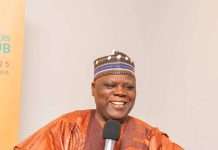
In this incisive interview with MOSES DIKE, erudite teacher and retired professor of Pharmacology, Reverend (Prof.) Fola Tayo, bares his mind on a number of issues affecting pharmacy practice and the Nigerian healthcare system in general. Tayo, who is currently the chief executive officer (CEO) of Health Systems Management Consultants and pro-chancellor of Caleb University also goes down memory lane to recall critical moments in his over 40 years of education at the highest levels, while suggesting ways to improve pharmacy practice in Nigeria and how the younger generation can make the best of their calling. Excerpts:
Sir, looking back at your early years, did you have some role models or personalities who influenced your choice of career, values and principles in life?
My father of blessed memory was a very bold, outspoken, hard-working, intelligent, diligent, very kind, compassionate, transparently honest and painstakingly thorough gentleman. Daddy would always call a spade a spade. He had no time for what I call “undiplomatic diplomacy” – which is actually lie – that has become the norm in this country these days. People would know that someone is guilty or wrong, but for some demonic and insane reasons, they would be silent and complain in a corner. This is a major reason why Nigeria is in the pit today.
My father loved the truth and had no time for mediocrity and indolence. He detested corruption in his day, yet the corruption of those days was “peanut”, compared to what we see today in the same country called Nigeria.
My father was disciplined and he taught us contentment. Daddy loved education and he wanted us all in the family to enjoy good education which he could not have. He lost his own dad when he was under 12 months old and was raised by the combined efforts of his mum and her dad who was fairly well off. So after Standard Six, he had to leave school. Dad was my hero in those days. I see a lot of him in me these days; hence, I do not seek to be popular. If you stand for righteousness, forget about popularity. I thank God he was my father, the best father that anyone could have, a man worthy of emulation.
I can also point to Chief Obafemi Awolowo, an extraordinary gentleman, very unique, highly principled and totally disciplined man. He was a visionary with a plan; a great leader who unfortunately came into this ugly world centuries ahead of his time, in a country that has no plan for progress but mediocrity and retrogression.
Those two civilised and cultured gentlemen (my dad and Chief Awolowo) were the people I saw near and afar and I was deeply attracted to them. I loved them with a passion for who they were. This is why I mock those stomach-politicians that parade themselves all over Nigeria’s landscape these days who don’t even understand the word socialism and go about stealing and looting our treasuries, yet calling themselves “socialists” or “Awoists”. I am sure Awo would be turning in his grave when such criminals talk these days. They are opportunists that are using Awo’s exceptional legacy for their selfish and devilish ends.
How would you describe your journey into Pharmacy? And what are some highlights of your career, so far?
Pharmacy, to me, was a divine choice, for obvious reasons. I had left Nigeria on 25 July, 1963, to study Law, which was my most natural choice because I wanted to be in the courts fighting for the rights of the poor and the underprivileged. I had a fairly revolutionary trait as a young school leaver.
My dad was a district councillor and, at a time, chairman of our Divisional Council. Our house was open to all and sundry and I had the opportunity of listening to cases brought to him. I was a very inquisitive little boy and wanted to know whatever was going on. Being daddy’s boy, he wanted me to be a lawyer. Perhaps I would have made a better lawyer than pharmacist – only God knows – but I am sure I would have been killed in this godless society where unrighteousness has temporarily suppressed righteousness and lawlessness is the order of the day.
While studying in the UK for GCE (Advanced Level) in Latin, English Literature and History, I shared a flat with some friends who were pursuing scientific careers. They were making fun of me that anybody could study Latin, “a dead language”, and History, “past events”. We set a bet and I told them I could also excel in their science and beat them in their specialty.
So, I enrolled with the then popular correspondence institute, Rapid Results College, London; and after nine months, I passed Chemistry, Physics, Mathematics, Geography and English Language. My competitors were in their second year of a two-year GCE Advanced level when I joined their Chemistry, Physics, Zoology, Pure and Applied Mathematics and came out well. What I did was to prove a point that he who did not do science subjects in secondary school, could trash GCE A Level, well ahead of them!
I was not afraid to take on any task because my father had taught all of us his children doggedness in our pursuits. When we were all at home, we were made to study after school hours from 4 pm to 7 pm, every day – except Saturdays and Sundays that the period was extended from 11 am to 6 pm. You were not allowed to entertain visitors or engage in any social activity. If you broke the rule, your punishment was never corporal. You would have to be sentenced to study for much longer than others. It was a very disciplined life because Papa was a “no-nonsense man”.
Then, I met a young Nigerian who was to become my lifelong friend and confidant, Pharm. Francis Olajide Ogunbanjo of LifeCare Chemist, Ilupeju, Lagos and later, Ventures & Trusts Ltd. (He passed away on 26 August, 2021). As at when we met, he had just completed his GCE Advanced Level in Chemistry, Physics and Biology at the then very popular Norwich City College and awaiting admission into the School of Pharmacy (University of London), Brunswick Square. He was the first to discuss Pharmacy with me.
When I completed the UK Central Universities Admission forms with the following options: Biochemistry, Medicine and Pharmacy, I was interviewed by three universities for the three programmes. Offers were made that if I passed GCE A Level with not lower than Chemistry B, Physics C and Zoology B or Pure & Applied Maths C, I would get into Pharmacy or Medicine, while Biochemistry would happily admit me with 3 Ds.
So, on that fateful Saturday morning, I had told my friend that any university or course that would first send me a letter of admission would be my preference. Well, Pharmacy came first, and I said that was it. On Monday, Medicine came, I said “no way” and later, Biochemistry crawled in and it was not my portion. That was how I started this long but fateful journey of Pharmacy.
What was your education like in a foreign country?
My first degree in Pharmacy was not without challenges and protests for my rights in the contemporary relatively hostile British university system. I was very vocal as a student, a defender of the oppressed, a political activist in the days of apartheid in South Africa and others.
I was, to all intent and purposes, a revolutionary that hated capitalism for its inhuman activities in Africa. I was a fan of Che Guevera and Fidel Castro of Cuba. By some divine intervention, even though I was a celebrated unbeliever or a staunch believer in myself, and my intrinsic ability and capability to attain to any height, what my teachers meant for evil, God turned for good (Genesis 50: 20). I was billed to be examined by a very cultured gentleman, one of the greatest pharmacologists of his days. Contrary to the expectation of my teachers, he was so impressed with my performance and offered me a postgraduate position in his university! So, I became the first in my undergraduate set to advance to a PhD in Pharmacology!
We all knew this was God at work in the life of a stark unbeliever; but I was later to know that even when I knew not His Son, Jesus Christ, He already foreknew me from the foundation of the world, chose me in Him before the foundation of the world, and predestined me unto the adoption of a child by Jesus Christ to Himself, according to the good pleasure of His will (Ephesians 1:5). Halleluiah! Amen.
Before my PhD in Pharmacology from the University of Strathclyde, Glasgow in 1975, my mentor, Professor William Cameron Bowman (of blessed memory) the co-author of the classical pharmacology text, Textbook of Pharmacology, had sent me to Jordanhill College of Education in Scotland in 1974 after I submitted my PhD thesis earlier than the stipulated 33 months. The goal was for me to learn teaching methods, curriculum development, educational psychology, and educational administration.
I was not very keen on this, however. I wanted to go into the industry or the USA to pursue a research career. Bill Bowman prevailed on me to return to Nigeria. He even communicated with my dad on one occasion. He was, to me, a resident father in those days.
It was Bill Bowman that introduced me to our own outstanding researcher and scholar, Professor Gabriel Ediale Osuide, FAS, FPSN, who was the Head of the Department of Pharmacy and Pharmacology at Ahmadu Bello University, Zaria, in September 1975. I was under domestic pressure to return to Lagos. Professor Ayodele Tella (of blessed memory) of the College of Medicine, University of Lagos, had met me in 1973 while I was presenting part of my work at the British Pharmacological Society Summer Conference at the University of Edinburgh, Scotland. Tella had wanted me to join his team in Lagos. It was very attractive to be home with my parents as a lecturer (Grade 1). However, Professor Bowman knew both Osuide and Tella and he preferred Osuide. Even though I was to be financially worse off in Zaria, I went to Zaria.
Zaria was a great challenge. We had a dynamic and research oriented professor, coupled with several young men. The discipline in the faculty was exceptional and we had a very healthy competition.
My sojourn in Ibadan was another evidence of divine intervention in my life. My wife and I (with our three children) were going to visit our parents in the South. We were driving and as we got to UI gate along Oyo Road, my wife said “that is the University of Ibadan.” I had never known Ibadan, so to say. My Nigeria before I left for the UK in 1963 had always been Lagos and its environs. So, out of curiosity we turned into the campus. I wanted to see the Department of Pharmacology. Hitherto, I had known (Profs) David T. Okpako and Lateef Akinola Salako through their scientific publications. They were domiciled in that great department at Ibadan. Salako was around, Okpako was on sabbatical at The Hospital for Sick Children in Toronto, Canada. Salako was very pleased to see me. He had read some of my publications. At the end of our visit, he offered me a position as a lecturer (Grade 1) in Pharmacology.
So, after two years in ABU, I joined Ibadan in September 1977. Ibadan afforded me a great opportunity to be mentored by the two eminent researchers and distinguished scholars, (Okpako and Akinola). These were two out of the great minds that made waves in Ibadan in those days. Theirs was a great academic department that was always appearing in Current Contents (a weekly publication of researches globally). Those gentlemen taught me science and diligence in research. They taught me how to think differently from the multitude. They sharpened my inquisitiveness. They helped to bring out the potential in me and mentored me for greatness in academia.
I finally came to Lagos on 13 January, 1989, fully convinced that the Lord was working with me, leading and directing my path. I was confident in spite of several negative reports I received from people.
How would you describe the current state of pharmacy education in Nigeria and what would be your recommendations on how to improve the lots of pharmacy education and practice in Nigeria?
Pharmacy education in Nigeria is a subject that is dear to my heart. I have been called names because of my radical view on pharmacy education in Nigeria. I am not surprised at all and it does not move me an inch because anyone who has my views must be considered eccentric by the ordinary people that surround him/her.
Just like every other profession, pharmacy education in Nigeria is still in its infancy. It is evolving and we – pharmacists in all spheres – must keep an open mind. To close our minds rigidly and tightly against change, is to commit a major blunder that will pave the way to an inevitable extinct of the profession. Yes, there is need for a change, but change per se is not the challenge. The more important is change management, that is, how to manage the change. Why did I advocate a change? Education is a dynamic process that has no room for stagnation.
Change, as profitable and desirable as it can be, needs to be well planned. Very often in this country we, including the government, fail to plan before commencing a project or programme. This usually leads into a blind alley and we derail completely.
You will say that pharmacy education has just adopted the doctor of pharmacy (PharmD) programme. Yes, very good indeed, but did we plan it well? Did we do the needful? Let me take you back memory lane. Towards the end of Obasanjo’s regime, I was invited by Professor Tayo Lambo, then Federal Minister of Health, to his office in Abuja. Among our discussion was pharmacy education, practice – vis-à-vis medicine – and medical practice in the country. We spoke at length. I remember advocating the need for the ministry to be fully involved for obvious reasons. I also gave solid and comprehensive recommendations that would ensure a successful commencement and sustenance of the programme.
In making such suggestions, I had looked into the future by some divine empowerment and considered that ad hoc arrangements would collapse when a “Pharaoh that did not know Joseph” ascended the throne. Neither would it be proper to train university undergraduates in secondary hospitals! University education is a tertiary education and should be done at tertiary institutions, except for primary healthcare.
Today, the NUC and the PCN have, in their wisdom, approved and decreed that henceforth, PharmD shall be the only qualification recognised for registration to practise pharmacy in Nigeria. Sounds very good, but did they work out the logistics of the move? Are we not aware of the incessant and mostly barbaric and retrogressive moves of the Nigerian Medical Association (NMA) and the medical consultants in the country?
Today, we are back to square one. Memoranda are flying all over the place against pharmacy students having access to patients’ bedside. Some of such memoranda are so illiterate and exhibit unpardonable barbarism considering that some of the authors are claimed to be “distinguished professors”! I weep for this purposeless country on a journey to retrogression. However, if we had addressed the issue pre-utero we would not be in the mess that we are plunged into now.
I also want to say that pharmacy teachers and generally teachers in Nigeria’s tertiary institutions must develop a more friendly approach to their students. For example, I had cases from some of our pharmacy faculties where lecturers would curse students and declare, “Oh out of your 70 intakes this year, in three years times, you will be lucky if you have 40 graduating!” That is criminal. Such lecturers should never see the inside of a university. He or she is better chained down in a psychiatric hospital because he must be insane.
(Continues next edition)












Your publications are nice and insightful.makes feel fresh instead of being tired .thanks first for taking the time.